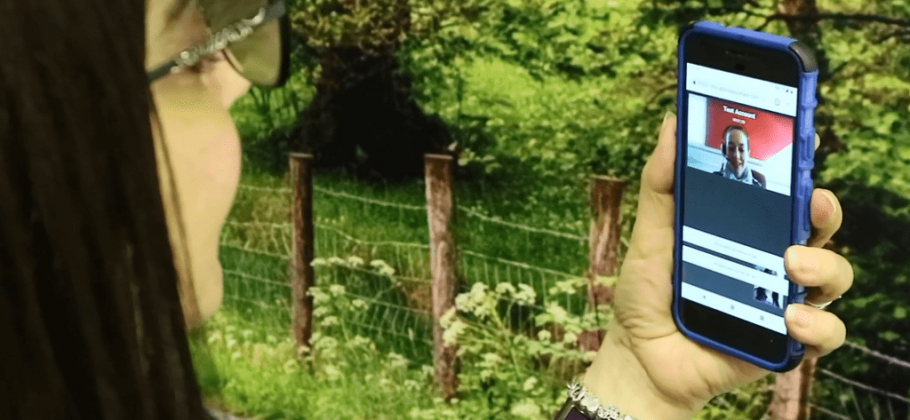New video consultation technology allows patients in Cumbria greater choice and flexibility with some of their appointments, reducing the need to travel.
Video consultations are being made available for some appointments as part of a pilot project involving several organisations from North Cumbria Health and Care in partnership with Cumbria Health on Call (CHoC). The video consultations allow patients to consult with their clinician remotely through a video feed on their devices, including phones, tablets, laptops and desktop computers.
The option provides greater flexibility for patients and reduces the distance they need to travel to attend their consultation.
Video consultations of this kind may also be arranged to take place from a predetermined location, such as a community hospital, where a Healthcare Assistant would be present with the patient and the clinician attending the appointment via a video connection. The technology offers the benefit that both the patient and clinician do not need to travel as far for the appointment to take place, as they may have done in the past.
The technology uses a secure connection and a platform which is also used extensively by Health Direct Australia and NHS Scotland. The project was started by the community led Co-production Working Together Group.
Professor Stephen Eames, System Lead for North Cumbria Health and Care said: “It is important as a health and care system that we are making use of every opportunity to support patients and our staff to work as effectively as possible, particularly given our rural location.
“I am delighted this technology has been piloted by a team that reflects collaboration across every part of our system and has been developed by community groups as well as clinicians.”
Where video consultation appointments are available patients have the opportunity to discuss their options fully including opting for a traditional appointment, if they still prefer to see their clinician in person.
If patients decide to use a video consultation they are provided with all of the relevant information they require ahead of their appointment. When they make the video call patients are greeted by a receptionist in the CHoC control room who confirms all of the patient’s details before connecting the patient through to the clinician.
Any feedback provided by patients who use the video consultations is channelled back into improving the process and patient experience.
The project has seen various pilot schemes running across Cumbria with six of the Integrated Care Communities (ICCs) in the north Cumbria area now using the technology with the remaining two ICCs ‘going live’ in the near future.
The project also currently incorporates: Mental Health Services, Oncology, Paediatric Nephrology, Health Visiting, School Nurses, Inglewood Residential Home (Wigton), Riverside Residential Home (Kendal), Grisdale Croft Residential Home (Alston), Christian Head Residential Home (Kirkby Stephen), Bridge House, Residential Home (Glenridding Health Centre, Millom Community Hospital Inpatient Unit, Kendal Primary Care Assessment Service, Haverigg Prison, Cumbria Health Extended Access Services at Furness General Hospital and CHoC’s out of hours service.
The project pilots will continue to develop over the next six months across North Cumbria Health and Care including partnership links with social services and Third Sector organisations as well as more services, departments, community hospitals, residential homes and pharmacies.
Operational Lead for Video Consultations in North Cumbria David Mansfield said: “We’re hoping by utilising and introducing this technology in Cumbria it will save people time, improve access, get people seen quicker and hopefully save them money, while maintaining a good patient experience. It is also intended to cut down travel for clinicians and maximises their time for appointments and consultations.
“There are some patients who travel to see their clinicians with the help of carers or with the help of other family members and we are hoping by utilising this technology that this also won’t be necessary with some patients.”
CHoC’s Information Management and Technology Manager Richard McGregor said: “It is essentially a video platform that is secure and can connect patients in our most remote and rural communities with clinicians. For both the patient and the clinician it’s going to be just as personal and professional as if they were both in the same room.”
Dr Deb Lee, who is part of the community-led Working Together Group, has pushed the development of this project. It has been supported and developed through coproduction with members of the west Cumbria community. Dr Lee said: “It’s important our community has the confidence this will be effective. If you were actually examining a patient you would see it at real size whereas with the camera that we use for some of these consultations you get a magnified image, which means the image is much clearer on a large screen.
“A tele-stethoscope can be used, for example, by a paediatric cardiologist during a video consultation so if they have a patient referred with a murmur they can listen to them remotely and decide whether or not they need to have an echo procedure carried out.”













